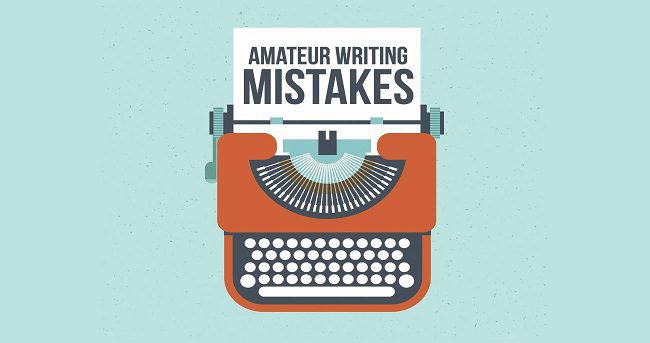Common Mistakes While Writing Content
None can deny that ‘content is king’ and though many of us tacitly acknowledge this fact, we tend to let our guard down while writing for the Web. Good content ups the ante for your website by boosting search engine rankings. A little patience and care will ensure that.
While there’s no silver bullet to make content appealing, there are many things writers can do to make it engaging. After all, the purpose of writing is to engage readers, sustain their interest, and make them want to read more. If that’s so, you should learn to step away from the manholes and blaze a trail that’s free from them. While that takes some doing, it’s worth it in the long run.
So let’s look at what we do wrong and how to set those mistakes right:

1. Inadequate Research
John Lutz once said, “Writing is hard work: it’s like doing homework for the rest of your life. You’re always chipping away at it.” How very true that is! You may be able to write on any topic under the sun, but that doesn’t mean you know it all. Use the Internet optimally. Find pieces of evidence and data that reinforce your ideas, and support your way of thinking and you have a winner. The material in your article should be comprehensive, and readable and readers should go with the feeling that they gained something. It’s often said that “Research is not only a science but also an art and it is not easy. It requires honest and hard work with patience and perseverance…” Not researching the subject well leaves loopholes and manholes open. Yes, research is hard work, but if you can impress readers that way, then why not?
2. Failing to Outline
When you erect a building, you have a blueprint that helps to give form and structure to conceptualized ideas. Writing is no different- you need a form that you can work on- a haphazard presentation of ideas doesn’t attract readers. That’s why you need an outline! Nothing very elaborate, just a little bullet-point session that briefly tells you what you need to focus on. A quick introduction, followed by a sequential transition of ideas brings a sense of clarity. And a conclusion that sums the whole thing up. Creating outlines takes up very little time and makes writing easier. So, don’t neglect that part just because you have it all in your head. Else you’ll miss out on something important.
3. Omitting to Edit.
Oftentimes, when you write, you’re left with a feeling of incompleteness; that’s because your writing lacks vim. As a responsible writer, you need to edit the article and ensure that readers aren’t caught in a quagmire of ideas. They need to come out refreshed and alive. Always allow some time to elapse before re-reading what you wrote. More often than not, you will get a new insight or see a new perspective. You’ll find a way to re-phrase sentences to make the flow more logical. You get a chance to check out the paragraph formation, and the formatting and see that all is as should be easy to read and easy on the eye. Editing can be tiresome, but if a good piece of writing becomes better because of that, it’s worth it.
4. Not proof-reading
Editing and proofreading are not the same- editing allows you to transform content so that it makes better reading, while proofreading catches those grammatical errors and duplicate words that can make reading a pain. Proofread a couple of times at least to make sure you catch all those tiny blemishes that spoil the whole. Reading aloud sometimes helps as you can detect errors that way- those that filter through when you skim with your eyes.
5. Failing to understand who your readers are
When you write, you don’t do it for yourself- you do it for your readers. Understanding the readers that you are targeting is imperative to good writing. For instance, if you’re writing about the ‘Big Bang Theory’, you’d need to simplify it if you’re writing for kids but obviously, that approach would change when you write for adults. The point is you need to understand your potential reader and ensure that you cater to that section from the beginning to the end. After all, writing is about appropriately connecting with your readers.
6. Never resort to keyword stuffing
You can’t wish away keywords- they are important. Keywords are used in search queries and search engines use them to connect to users. However, if your whole focus is on the use of keywords, your articles will not be intuitive and will not provide the information that users want. Write for search engines that look for keywords, but don’t write exclusively for them- your readers are your top priority. It’s possible to keep the integrity of the article intact while using relevant keywords sparingly.
7. Not Using Subheads
Studies show that today’s readers look for ‘abbreviated information’- in the sense, that they want ‘more encapsulated in less’ without losing out on appeal. The best way to do that is to use sub-headings. More information can be doled out in the form of ‘bulleted lists’ than in a wall of uninspiring text.
Subheadings give readers an inkling of what’s going to follow and they also set the pace. Interesting subheadings make readers want to delve in more deeply, and that’s the very goal of writing.
Conclusion
If you want to write better, you need to rectify the things that you do wrong, and in the long process, learn to make fewer mistakes. Quality content is a writer’s first goal-post, but scoring goals is hard work for it requires the will to improve, the will to overcome and the will to ‘stop making those mistakes’.
An anonymous quote states- “Don’t carry your mistakes around with you, place them under your feet and use them as stepping stones.”
Writers, do you hear?

